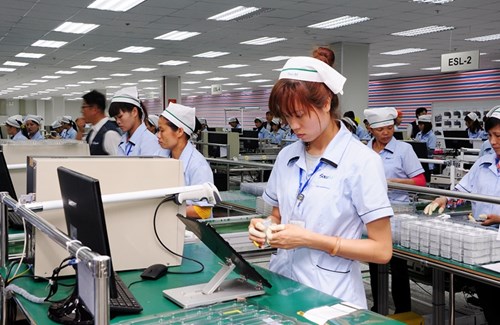Vu Tien Loc, chairman of the Vietnam Chamber of Commerce and Industry (VCCI) made the remarks at a recent seminar in Hanoi on policy dialogues between investment and investment recipient countries and how to maximize multinational businesses’ impacts on steady employment for Vietnam’s electronics industry.
    |
 |
|
Domestic, FDI business partnerships provide spark for electronics. Photo for illustration: baovinhphuc |
The electronics industry has swiftly become one of the most important sectors of the national economy. Vietnam is one of the twelve leading electronics manufacturing workshops in the world and ranks third in ASEAN. Last year’s electronics exports hit more than US$71 billion, 2.5 times higher than that of the garment sector and nearly five times that of footwear. It also topped Vietnam’s key export sectors.
The number of electronics companies doubled in the five years from 2012 to 2017, reaching 1,237 in 2015, while the number of workers tripled from 238,821 in 2011 to 611,429 by the end of 2017. The industry has also drawn large amounts of foreign direct investment (FDI) capital into Vietnam.
There is one drawback to the successes of the sector, it is that 99 out of 100 large electronic businesses are foreign-owned. Accordingly, FDI businesses made up 95% of the sector’s export value and 70% of sales revenue on the domestic market. Most of the FDI businesses in the electronics sector are using Vietnam as a base for their assembly workshops.
Over the past years, FDI businesses have failed to connect with domestic small and medium-sized partners so that they might reduce costs and improve their competitive capacity, not to mention overcoming their weakness in social responsibility.
A survey of the sector carried out last year found 1,700 violations, showing that greater efforts should be made to ensure that labor standards are met in future. Based on the current state of the industry, the Japanese Government, the International Labor Organization (ILO), VCCI and the Vietnam Electronic Industries Association (VEIA) decided to implement a pilot project in the electronics sector and set up an e-Business Alliance in October 2017 with the aim of building and promoting an action program for socially responsible labor practices and enhancing connectivity between FDI and domestic businesses.
These are important initiatives to develop the electronics industry in the current circumstance, ensuring that the sector can integrate successfully, thus bringing benefits to both Vietnamese and FDI business communities, says Mr Loc.
Over a short time, 127 businesses have signed up to the project of improving the quantity and quality of work through socially responsible labor practices in Vietnam’s electronics industry. These businesses have benefited from the project through its training activities and policy dialogues and they have indirectly generated nearly half of the workforce to serve the industry.
Many businesses say that deploying social responsibility programs in the electronics industry will help to improve competitiveness as it will attract highly skilled workers and improve their ability in industry. With abundant skilled labor forces, businesses will be afforded the conditions to modernize and adopt new technologies to supply high quality products.
Showing social responsibility also helps businesses develop their brands, as it builds trust with the customer base, says the VCCI chairman.
Chang-Hee Lee, ILO director in Vietnam, says normally in other countries, strategic economic sectors like electronics will create momentum for the whole national economy. That’s why greater investment should be poured into the establishment and expansion of the alliance, as it will set a shining example for other economic sectors to follow and multiply the model in future, he notes.
Source: VOV